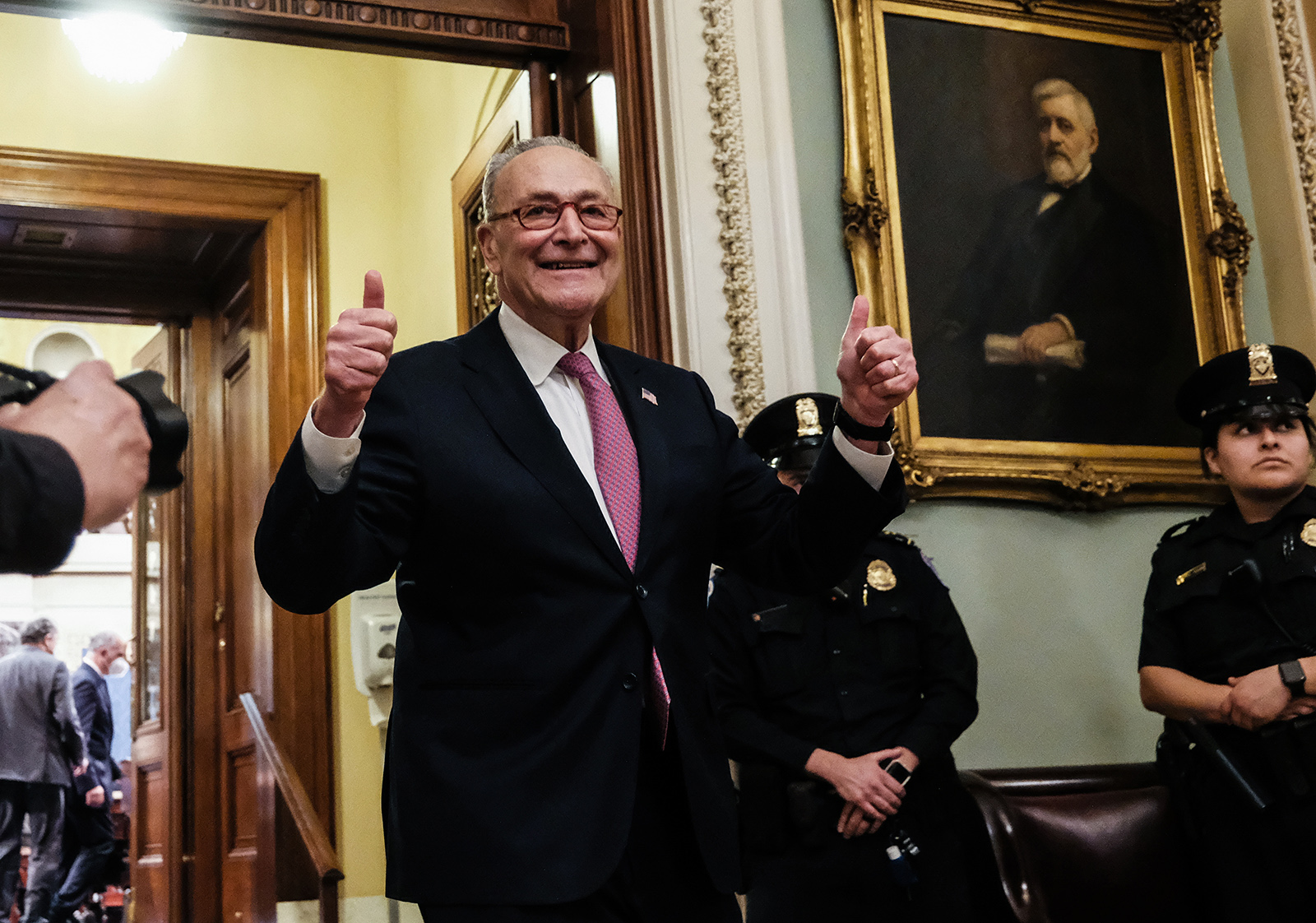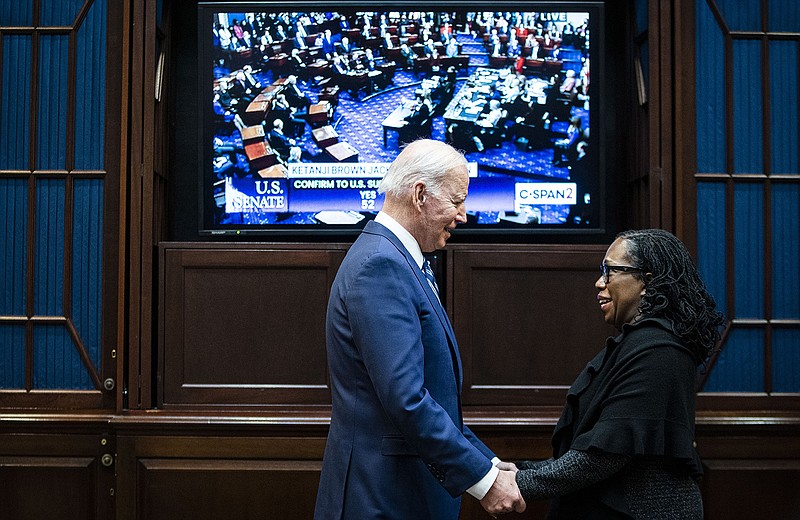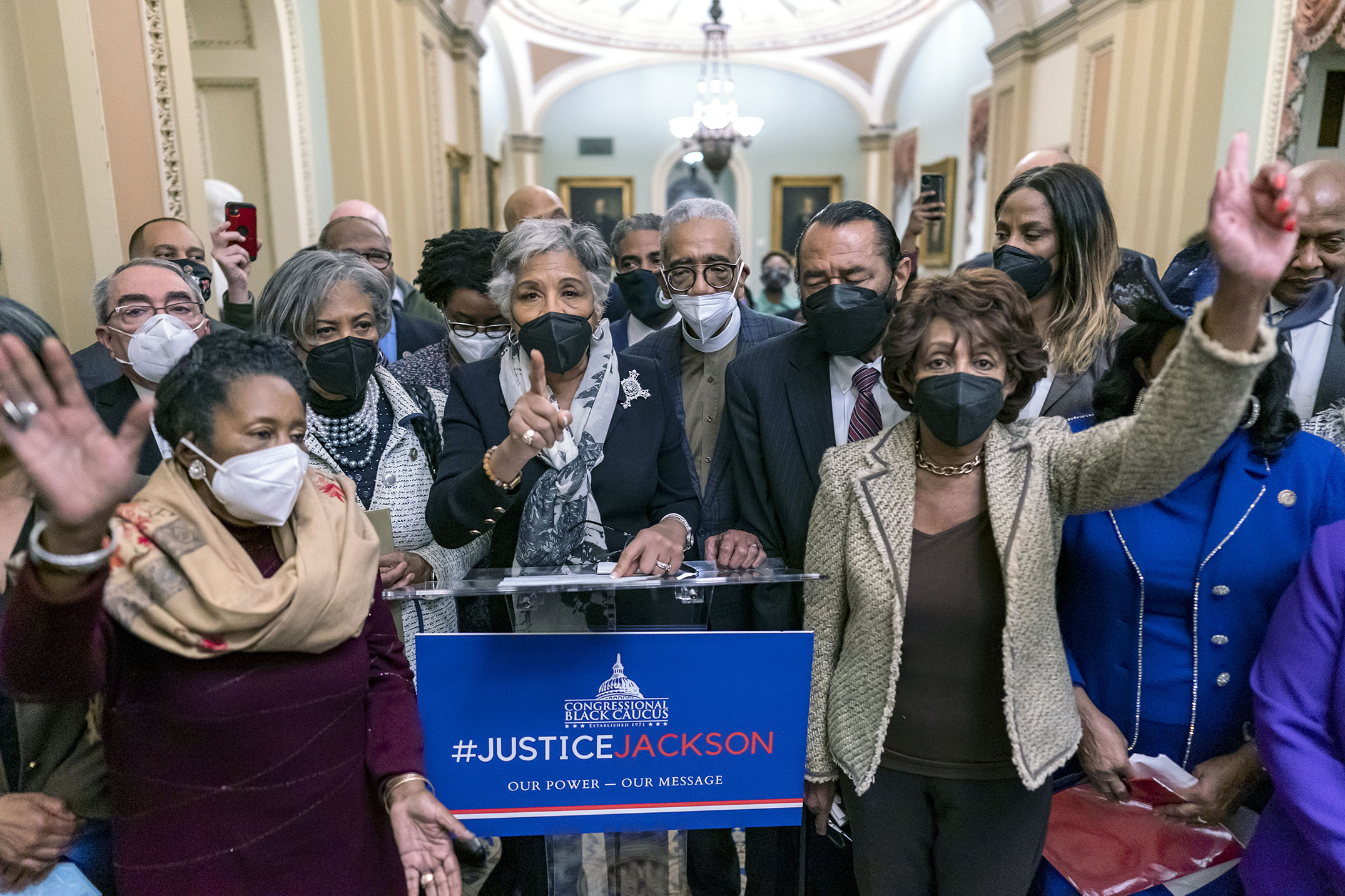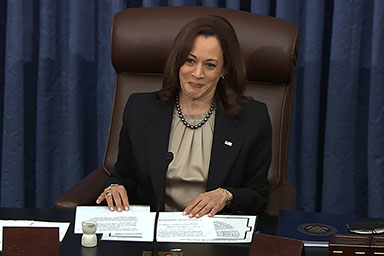WASHINGTON -- The Senate on Thursday confirmed Judge Ketanji Brown Jackson to the Supreme Court, making her the first Black woman to be elevated to the pinnacle of the judicial branch in what her supporters hailed as a needed step toward bringing new diversity and life experience to the court.
Jackson was confirmed on a 53-47 vote, with three Republicans joining all 50 members of the Democratic caucus in backing her.
Jackson's backers saw the confirmation as an uplifting occasion for the Senate and a mark of how far the country has come.
Jackson, whose parents attended segregated schools, has two degrees from Harvard University and, at 51, is in line to succeed Justice Stephen Breyer when he retires at the end of the court's session this summer, making her a justice in waiting.
"Even in the darkest times, there are bright lights," Sen. Charles Schumer, D-N.Y., the majority leader, said on the Senate floor. "Today is one of the brightest lights. Let us hope it's a metaphor, an indication of many bright lights to come."
He added, "How many millions of kids in generations past could have benefited from such a role model?"
At the Capitol, the galleries, closed for much of the pandemic, were full of supporters on hand to witness the historic vote. The chamber broke out in cheers, with senators, staff and visitors all jumping to their feet for a lengthy standing ovation when the vote was announced.
"After weeks and weeks of racist, misogynistic and stomach-churning attacks, we cannot wait to finally call her Justice Jackson," said Derrick Johnson, president of the NAACP, describing the moment as one of "enormous consequence to our nation and to history."
Judith Browne Dianis, executive director the Advancement Project, a civil-rights organization, said Jackson will make the court more reflective of communities that are most impacted by the judiciary.
"The highest court in the land now will have a firsthand perspective of how the law impacts communities of color -- via voting rights, police misconduct, abortion access, housing discrimination or the criminal legal system, among other issues," she said. "This will ultimately benefit all Americans."
Not everyone shared in the joy of the day. As applause echoed from the marbled walls, Sen. Mitch McConnell, R-Ky., the minority leader, turned his back and slowly walked out, as did most of the few Republicans remaining on the floor, leaving half of the chamber empty as the other half celebrated.
"When it came to one of the most consequential decisions a president can make, a lifetime appointment to our highest court, the Biden administration let the radicals run the show," McConnell had said earlier, making one last argument against the judge, whose nomination he framed as an example of extremists taking control of the Democratic Party. "The far left got the reckless inflationary spending they wanted. The far left has gotten the insecure border they wanted. And today, the far left will get the Supreme Court justice they wanted."
Three Republicans -- Sens. Susan Collins of Maine, Lisa Murkowski of Alaska and Mitt Romney of Utah -- crossed party lines to vote to confirm Jackson, lending a modicum of bipartisanship to an otherwise polarized process.
HARRIS 'DEEPLY MOVED'
Jackson's confirmation was seen as a major achievement for President Joe Biden, who had promised at a low point during his 2020 primary campaign that he would appoint a Black woman to the Supreme Court at his first opportunity. As a former public defender, Jackson is the leading example of the emphasis the administration has put on expanding not only the personal diversity of the courts, but also the professional. She will be the first-ever public defender to serve as a Supreme Court justice.
Vice President Kamala Harris, the first Black woman to hold the position and one of just 11 Black senators in American history, presided over the vote -- one historic figure presiding over the elevation of another -- as senators stated their positions from their desks. More than a dozen members of the Congressional Black Caucus, including Reps. Hakeem Jeffries, D-N.Y., and Joyce Beatty, D-Ohio, clustered on the Senate floor to mark the occasion.
At the White House, Biden and Jackson watched the vote together from the Roosevelt Room, embracing and taking selfies in front of a television screen displaying the final vote count. Officials said the two would appear at an event today to mark Jackson's confirmation, although she will not be sworn in for months.
"I'm overjoyed, deeply moved," Harris told reporters after the vote. "There's so much about what's happening in the world now that is presenting some of the worst of this moment and human behaviors. And then we have a moment like this."
"This is a tremendously historic day in the White House and in the country," said White House press secretary Jen Psaki after the vote. "And this is a fulfillment of a promise the president made to the country."
The White House and Democrats, given their precarious hold on the evenly split Senate, wanted to move as quickly as they could after Breyer announced his retirement plans in February to put in place a successor.
Faced with a historic pick who would not change the ideological divide of the court, top Senate Republicans initially promised a respectful review of her record to show they could scrutinize a judicial nominee without personal attacks.
But as the hearings approached, many Republicans sharpened their tone.
McConnell took strong issue with Jackson's refusal to take a position on proposals to add seats to the Supreme Court -- a priority of progressive groups that were enthusiastic backers of Jackson.
Sen. Josh Hawley, R-Mo., who has presidential ambitions, claimed that a review of her sentencing record in child sex abuse cases showed a pattern of handing down penalties lighter than recommended by prosecutors.
Republicans also faulted her for representing terror detainees at the military prison in Guantanamo Bay, Cuba, as an appointed public defender and signing court papers that accused President George W. Bush of committing war crimes for torturing detainees.
"She is an extreme outlier on the question of crime," Sen. Ted Cruz, R-Texas, said not long before the vote, reiterating attacks that have been debunked by several independent analysts, who note that Jackson's sentencing record is well within the mainstream.
Sen. Marsha Blackburn, R-Tenn., claimed that "the dark money leftist groups" supporting Jackson were "trying to push this agenda of woke education."
Republican Sens. John Boozman and Tom Cotton of Arkansas both voted against the nomination.
During Jackson's confirmation hearing before the Senate Judiciary Committee, Cotton attacked her criminal sentencing record and aimed to paint her as soft on crime as a federal appeals court judge. He also took to the Senate floor earlier this week to lambaste Jackson's record and chided her as a "dangerous" judge who "built her career as a far-left activist."
"She personifies activism from the bench," Cotton said. "She has crusaded to undermine criminal sentences, and she cannot be trusted to interpret the law or the Constitution as written."
Boozman, in a statement earlier this week, said he was "concerned by her judicial activism and record of legislating from the bench instead of interpreting the law as written."
The few Republicans who backed Jackson rejected such criticisms, as well as what Murkowski called the "corrosive politicization" of the Supreme Court confirmation process.
While Democrats had the votes to confirm Jackson on their own if their caucus united behind her, they wanted some Republican backing. Sen. Dick Durbin, D-Ill., chair of the Judiciary Committee, worked to bring some Republicans on board, and the White House made Jackson available to potential GOP supporters both before and after the hearings.
A turning point came last week when Collins announced she would back the nominee after a second sit-down with the judge to clear up some issues that arose during the hearings. Murkowski, whose decision was complicated by a difficult reelection race, and Romney soon followed.
By Thursday, the outcome of the vote was never in doubt, but it dragged on for almost 30 minutes because Sen. Rand Paul, R-Ky., was not present on the floor. Once he had arrived, Paul cast his "no" vote from the Senate cloak room because he was dressed too casually to meet the jacket-and-tie dress code for the chamber.
When Harris called the vote, Romney stood to join Democrats in applauding, but many Republicans had already departed.
But on Thursday, her supporters were ebullient.
"Nobody's going to steal my joy," Sen. Raphael Warnock, D-Ga., said in remarks before the vote. "I'm a senator, I'm a pastor. But beyond all that, I'm the father of a young Black girl." He said Jackson's ascension to the nation's highest court exemplified "the promise of progress on which our democracy rests."
Once sworn in, Jackson will be the second-youngest member of the court after Amy Coney Barrett, 50. She will join a court on which no one is yet 75, the first time that has happened in nearly 30 years.
Jackson's first term will be marked by cases involving race, both in college admissions and voting rights. She has pledged to sit out the court's consideration of Harvard's admissions program since she is a member of its board of overseers. But the court could split off a second case involving a challenge to the University of North Carolina's admissions process, which might allow her to weigh in on the issue.
'UNCHARTED TERRITORY'
The busiest six weeks of Jackson's life are likely to turn into a three-month wait now that she has won approval to occupy a Supreme Court seat that won't open until late June or early July.
It will be an unprecedented position, created by the timing of Breyer's retirement announcement coupled with Democrats' decision to put her confirmation on a relatively fast track. Jackson now serves on a federal appeals court in Washington, though she has put her work there on hold since her Feb. 25 nomination.
Previous justices have typically had only a few days after winning confirmation to start working on the nation's highest court.
"We really are in uncharted territory here," said Marin Levy, a Duke University Law School professor who specializes in judicial administration and studies Supreme Court history.
The first Black woman justice won't start hearing arguments until the next term begins in October.
The justice-in-waiting hasn't said how she'll spend the next three months, though she will likely devote time to hiring law clerks and deciding how she will run her chambers.
She may also be due for a long vacation after a demanding confirmation process that didn't stop once she finished her Senate testimony March 23. Since then, she has met with at least 16 senators and answered 1,154 written questions, many of them multipart, from Republicans on the Senate Judiciary Committee.
Although Jackson can remain on the appeals court until Breyer retires, she's unlikely to take on any new cases because she would then have to recuse from those matters should they get appealed to the Supreme Court.
Like previous nominees, she hasn't participated in rulings since her nomination, even for cases in which she heard arguments.
Each of last three justices to join the Supreme Court -- Barrett, Brett Kavanaugh and Neil Gorsuch -- was sworn in with a term in progress. Barrett heard her first argument a week after being confirmed in 2020. She heard eight cases during her first two weeks, all by phone because of the coronavirus pandemic, including a major challenge to the Affordable Care Act.
Kavanaugh had even less time in 2018, taking the bench three days after his Senate confirmation.
Gorsuch had so much to do when he was confirmed in 2017 he skipped his first private conference with his new colleagues so he could focus on the seven cases the court would hear the following week. Gorsuch took the bench for the first time a week after being sworn in.
In 2006, Justice Samuel Alito attended the State of the Union address only hours after being confirmed.
Even so, the coming months will give her time to "get her sea legs" and "figure out her chambers and just get the folkways of the court down," said Barbara Perry, a presidential and Supreme Court scholar at the University of Virginia's Miller Center.
Some experts say Jackson's hurry-up-and-wait timeline may become the new normal, particularly during election years when presidents want to get their nominees confirmed while their party controls the Senate -- and when retiring justices want to ensure their successors can be seated.
"I would imagine that will actually see more of these situations for justices who say that they're going to retire," Levy said. "That is, they want to finish out a term but want to provide ample time for someone to be named and then go through the confirmation process."
Information for this article was contributed by Carl Hulse and Annie Karni of The New York Times; by Greg Stohr of Bloomberg News; by Lisa Mascaro, Jessica Gresko, Zeke Miller, Farnoush Amiri, Aaron Morrison, Mary Clare Jalonick and Mark Sherman of The Associated Press; and by Ryan Tarinelli of The Arkansas Democrat-Gazette.
 Senate Majority Leader Charles Schumer acknowledges the Senate confirmation of Judge Ketanji Brown Jackson to the Supreme Court on Thursday. “Even in the darkest times, there are bright lights,” Schumer said on the Senate floor. “Today is one of the brightest lights. Let us hope it’s a metaphor, an indication of many bright lights to come.” (The New York Times/Michael A. McCoy)
Senate Majority Leader Charles Schumer acknowledges the Senate confirmation of Judge Ketanji Brown Jackson to the Supreme Court on Thursday. “Even in the darkest times, there are bright lights,” Schumer said on the Senate floor. “Today is one of the brightest lights. Let us hope it’s a metaphor, an indication of many bright lights to come.” (The New York Times/Michael A. McCoy)

